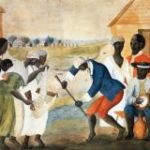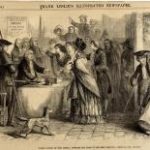This lesson uses City of Ladue v. Gilleo as the basis for discussion of First Amendment rights. Students will argue for both sides of the case, and a group of students will serve as the city council; they will questions both sides and ultimately decide whether the ordinance should be upheld or not. The resource person might then lead a discussion on local laws regarding signs, posters, and handbills.
The Reconstruction Amendments: Official Documents as Social History
The Fourteenth Amendment was the most important constitutional change in the nation’s history since the Bill of Rights. Its heart was the first section, which declared all persons born or naturalized in the United States (except Indians) to be both national and state citizens, and which prohibited the states from abridging their “privileges and immunities,” depriving any person of life, liberty, or property without due process of law, or denying them “equal protection of the laws.” Free registration for students and teachers required to access resource.
Dolley Madison and Slavery

This short video presents Dolley Madison as a typical member of the antebellum slaveholding gentry. Dolley, like her southern contemporaries, saw slaves as property. Professor Catherine Allgor notes that when Dolley Madison began selling her slaves in the 1840’s, she was strongly criticized by the abolitionist press.
Women Vote in New Jersey (1776-1807)

This short video focuses on late 18th century New Jersey—the only state which (temporarily) enfranchised (some) women. The 1776 New Jersey constitution granted voting rights to all property-owning inhabitants while the constitutions of 1790 and 1796 referred to voters as “he and she.” Professor Rosemarie Zagarri concludes that the political ideology of the American Revolution did have lasting implications for women, even though New Jersey rescinded their voting rights in 1807.
Women Before the American Revolution
This short video explores the limited rights of women prior to the American Revolution. According to the idea of femme covert, women were legally and politically subservient to their husbands. Married women could not own property and all women were considered irrelevant to the political sphere. Professor Rosemarie Zagarri notes that 80% of the freemen in the colonies could vote (as compared to 20% in Great Britain), but suffrage was still limited to men.